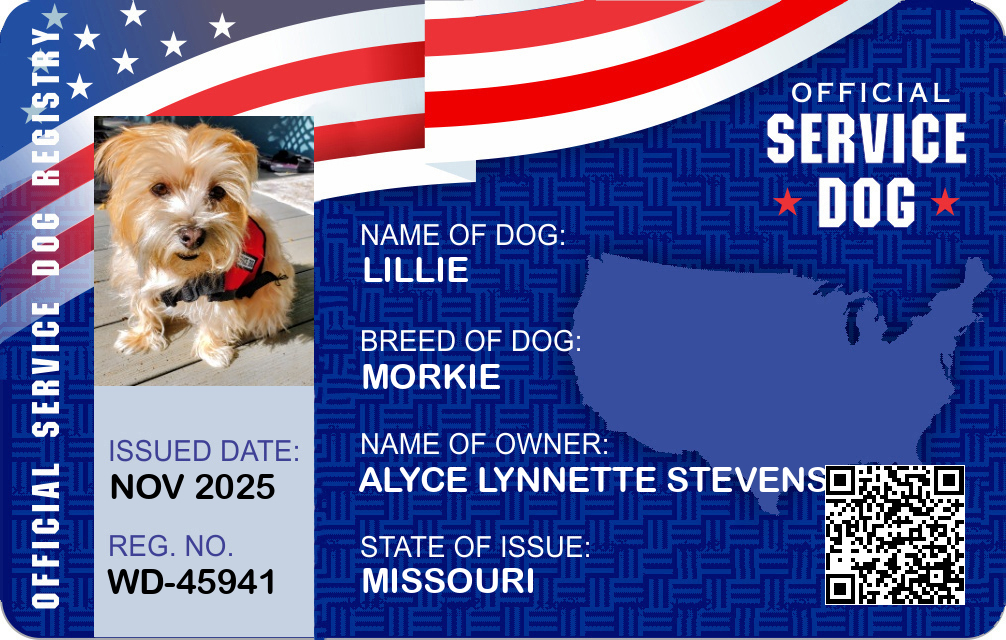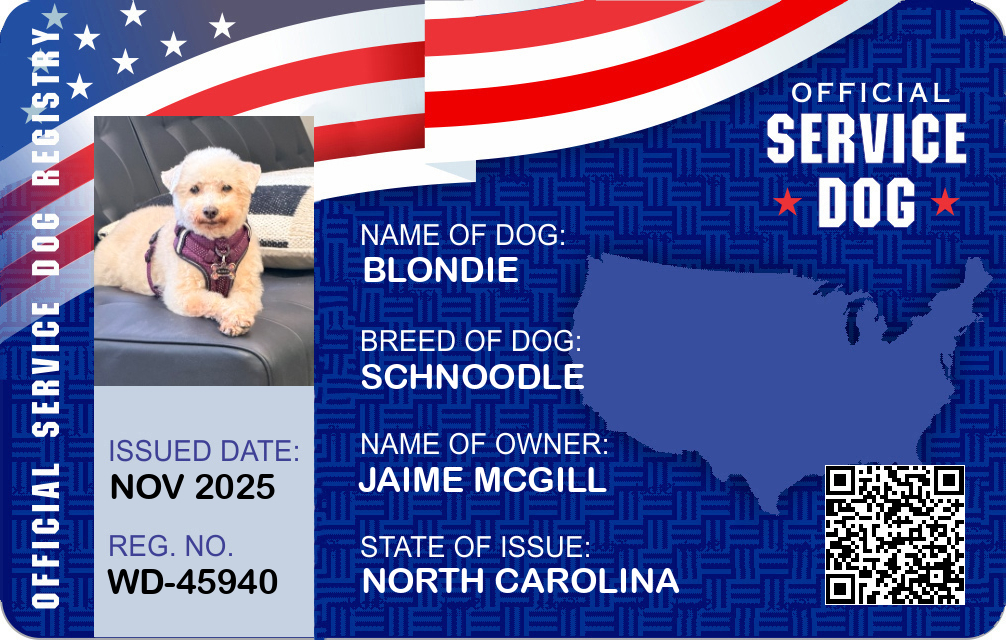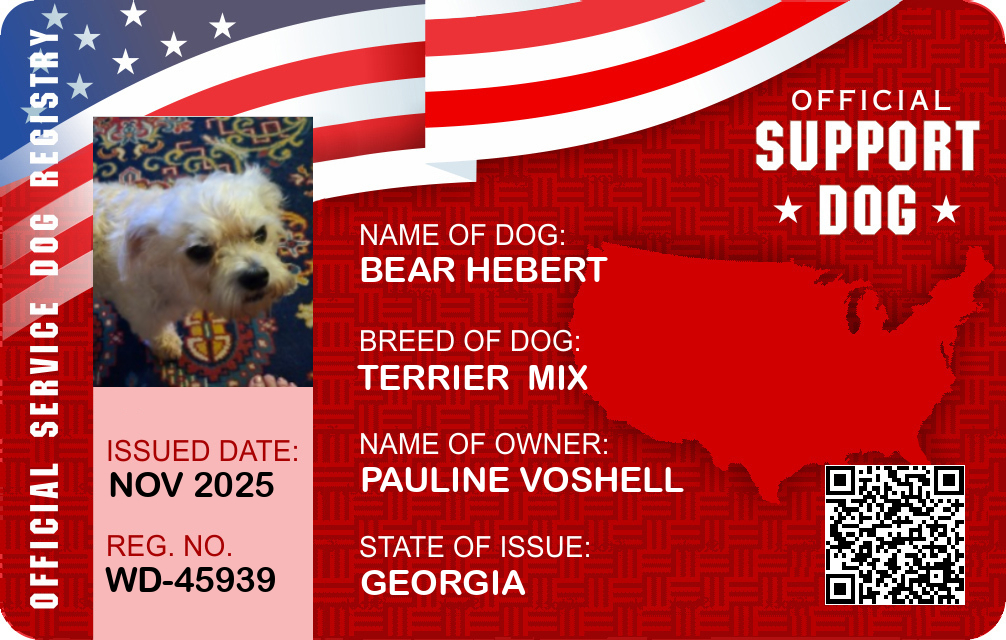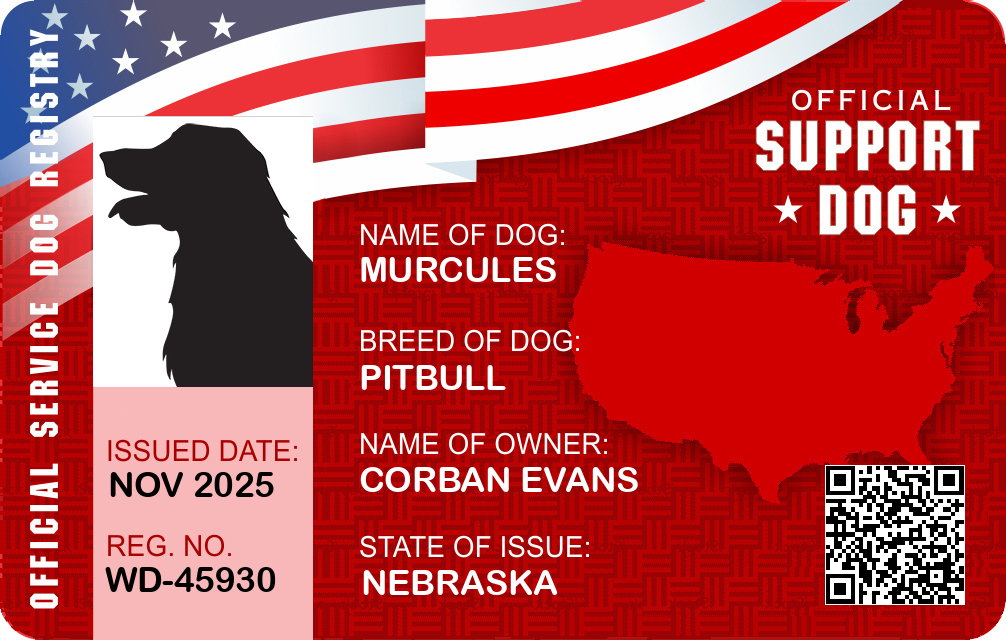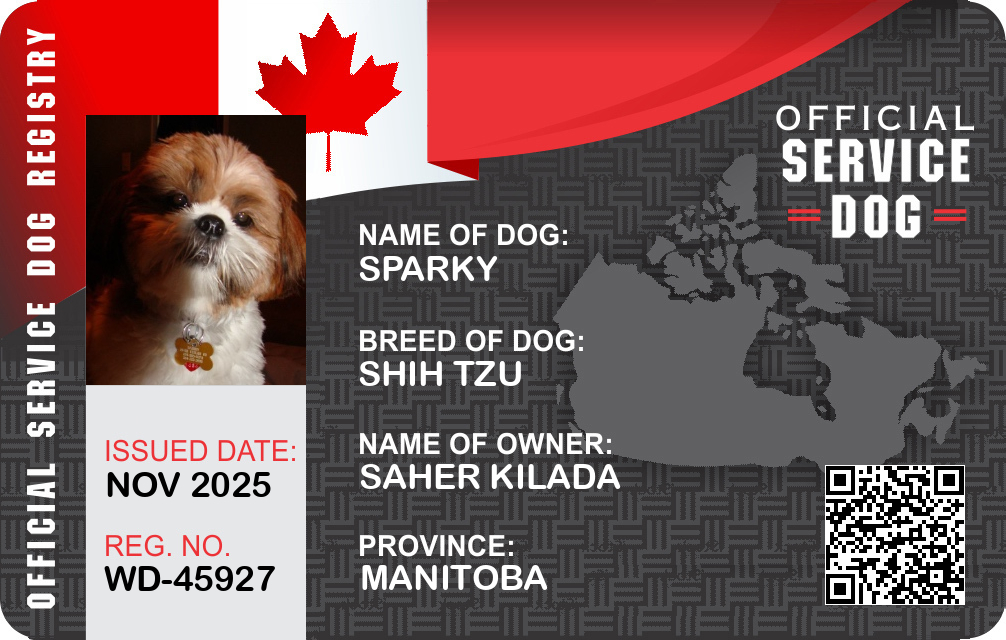Wisconsin Service Dog Laws
Register Your Dog
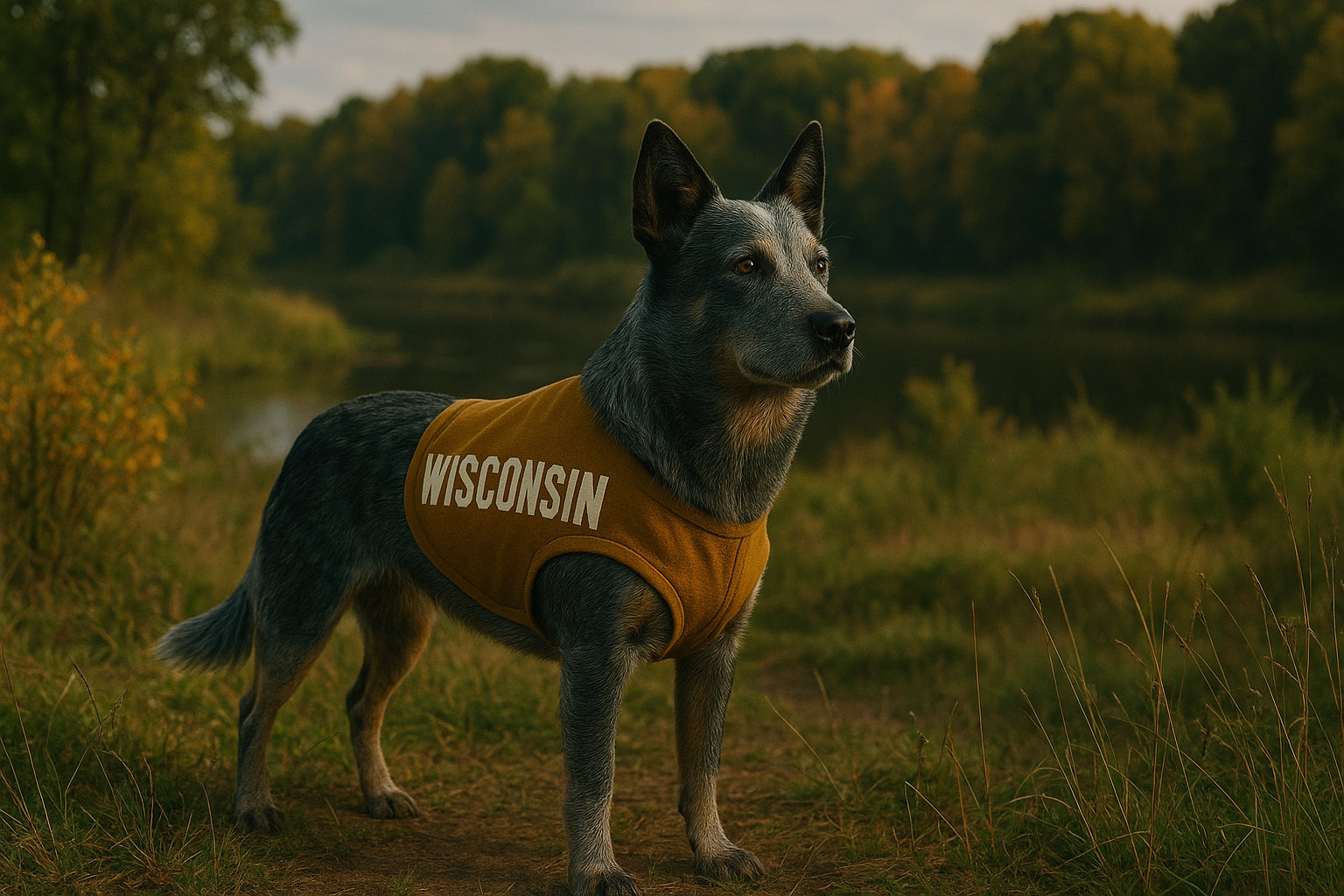
Overview of Service Dog and Legal Definitions in Wisconsin
Navigating service dog laws can be complex, especially when federal guidelines intersect with state-specific regulations. This guide provides a comprehensive overview of the rules and rights concerning service dogs in Wisconsin.
What is a Service Dog?
In Wisconsin, as in the rest of the United States, service dogs are defined under the Americans with Disabilities Act (ADA). A service dog is a specially trained canine that assists individuals with disabilities. These disabilities can be physical, sensory, psychiatric, intellectual, or other mental disabilities. The defining characteristic of a service dog is its training to perform specific tasks directly related to the handler’s disability, such as guiding visually impaired individuals or alerting those with hearing impairments to sounds.
How Service Dogs Differ from Other Types of Assistance Animals
Service dogs are distinct from other forms of assistance animals, including emotional support animals (ESAs) and therapy animals. While ESAs provide companionship and emotional support that can alleviate symptoms of mental or emotional conditions, they do not have the training to perform specific tasks. Consequently, ESAs do not enjoy the same public access rights as service dogs under federal law. Therapy animals, likewise, support groups of people rather than individuals with disabilities and are usually found in settings like hospitals or nursing homes.
Key Federal Laws Affecting Service Dogs (e.g., ADA, FHA, ACAA)
Several federal laws outline the protections and rights of service dog handlers:
- Americans with Disabilities Act (ADA): The ADA guarantees the right of service dog handlers to access public spaces, including businesses, governmental facilities, and transportation services.
- Fair Housing Act (FHA): This law dictates that individuals with disabilities and their service dogs or assistance animals cannot be discriminated against in housing. Wisconsin aligns with these federal standards in prohibiting landlords from denying housing based on the presence of a service dog.
- Air Carrier Access Act (ACAA): According to the ACAA, individuals with disabilities can travel by air with their service dogs, though airlines can require advance notice and documentation under certain circumstances.
State-Specific Service Dog Laws in Wisconsin
Wisconsin upholds federal standards regarding service dogs while also embedding specific requirements and exceptions into state law. State laws align closely with federal mandates, ensuring that service dog handlers have robust protections whether in housing, employment, or public access.
Housing Rights and Responsibilities
Under Wisconsin law, service dog handlers are afforded rights parallel to those guaranteed by the FHA. Property owners and landlords must accommodate service dogs, waiving any “no-pet” policies when an animal meets the criteria of a service animal. Landlords can request proof of the need for a service dog, but the conversation about an individual’s specific disability should remain considerate and confidential.
Tenants are responsible for any damage caused by the animal beyond normal wear and tear, ensuring that both tenants and landlords have clearly outlined expectations within the leasing agreement.
Public Access and Accommodation
The ADA’s regulations for public access are mirrored by Wisconsin’s provisions. Service dogs are allowed to accompany individuals with disabilities in most public settings, including restaurants, hotels, and stores. Exceptions may include areas where the animal would pose a legitimate safety risk or where its presence could fundamentally alter the nature of a business operation—such as sterile environments in operating rooms.
Transportation and Travel Rules
Service dogs can accompany their handlers on all forms of public transportation within Wisconsin, protected under the ADA. This includes buses, trains, and other public transit systems. Driving services like Uber and taxis must also comply, though handlers should be prepared to present the service dog’s credentials if questioned.
Employment and Workplace Considerations
Employment protections for service dog handlers in Wisconsin derive from both the AD
A and the Wisconsin Fair Employment Act. Employers must provide reasonable accommodations for employees who require a service dog, unless it would impose an undue hardship on the operation of their business. Employment levels all the way from school settings to corporate offices fall under this purview, provided the service dog’s presence is justifiable in relation to the employee’s duties.Documentation, Requirements, and Processes in Wisconsin
Service Dog Documentation and Who Can Issue It
In Wisconsin, service dog handlers are not legally required to carry documentation or certification for their animals; however, many choose to do so to facilitate smoother interactions in public and rental settings. Documentation can include training certificates or letters from medical professionals explaining the necessity of the service animal.
Landlord, Business, and Provider Verification Rules
While businesses and landlords in Wisconsin can ask if an animal is a service dog and what tasks it has been trained to perform, they cannot demand proof of training or ask about the handler’s specific disability. Providers, including health professionals, can verify an individual’s need for a service dog by supplying relevant documentation without divulging confidential health information.
Rights, Limitations, and Legal Risks
Rights Service Dog Handlers Have in Wisconsin
Handlers in Wisconsin enjoy extensive rights, such as access to public places, rental properties, and workplaces without facing discrimination due to their service dog. They must not be subjected to additional fees due to their service animal, though they are liable for any extraordinary damages caused by the animal.
Limits on Service Dog Protections and Common Restrictions
There are limitations on service dog access. Establishments can deny access if a service dog is out of control, not housebroken, or threatens the safety and health of others. Dogs lacking specific task training or poorly behaved may also face access restrictions.
Penalties for Fraud or Misrepresentation
Misrepresenting a pet as a service dog is illegal in Wisconsin and is dealt with through fines and other legal repercussions. Such actions undermine the rights of legitimate service dog handlers and are taken seriously by law enforcement.
Practical Guidance for Service Dog Handlers in Wisconsin
How to Qualify for a Service Dog Legitimately
To qualify for a service dog, individuals in Wisconsin must have a disability as defined under the ADA and require a task-trained dog. Collaborating with certified trainers or service dog organizations can ensure that the legitimate qualification process is followed.
How to Talk to Landlords, Airlines, and Employers
Effective communication is vital in ensuring compliance with service dog laws. When discussing needs with landlords, airlines, or employers, handlers should proactively present any relevant documentation and stress the trained functions of their service dog to minimize misunderstandings.
Summary of Service Dog Laws in Wisconsin
Wisconsin’s alignment with federal statutes ensures that service dog handlers enjoy wide-ranging protections. However, understanding the nuances of these laws is crucial for both handlers and those who must accommodate them.
Key Takeaways for Service Dog Handlers in Wisconsin:
- Service dogs are defined as trained to perform tasks for individuals with disabilities.
- Federal laws like the ADA provide a broad framework, supplemented by Wisconsin-specific rules.
- Housing and public access accessibility are integral rights for service dog handlers.
- Documentation can aid in smoother transactions but is not legally required in most areas.
- Legal penalties exist for those falsely misrepresenting pets as service dogs.
- Clear communication with landlords, airlines, and employers promotes transparency and compliance.
Understanding these laws can guide service dog handlers through successfully navigating their rights and responsibilities within Wisconsin, ensuring dependable support for their needs while fostering an environment of respect and inclusion.



